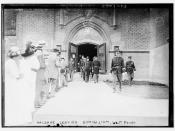American trade with increased in the 1890s. The United States had long demanded an for trading in China, which was weak, in order to prevent other powers from carving up China among them. But France, Russia, England, and Japan bit off pieces for themselves by annexation or by establishing spheres of influence, where they exercised economic privileges.
As its rivals made gains, the United States feared it would be excluded from all trade in China. In 1899 Secretary of State sent the European powers and Japan a series of "Open Door Notes," requesting agreement on three points. First, each power would respect the trading rights of the others within each nation's sphere of influence; second, Chinese officials would collect import duties; and third, no nation would discriminate against the others in matters of harbor duties or railroad rates within each sphere of influence. Hay declared the principles accepted, inaccurately, since Russia and later Japan disagreed.
Not all the Chinese welcomed western penetration of their culture. In 1900 the broke out in China. The Boxers-a sect of Chinese nationalists who opposed foreign influence in China-rose up against foreign traders, officials, and missionaries, and massacred many of them. The United States and the European powers intervened with troops and put down the insurrection. The European powers seemed eager to carve up China, but Hay persuaded them to accept compensation to cover their losses. The United States returned part of its compensation to China. The McKinley administration had stopped Europe from carving up China.
Circa 1840, the period of our global focus on the silk industry, no country was undergoing as vast of an economic and political transformation as China. A war against the powerful countries of the West was impending, and China struggled to maintain its Circa 1840, the period...


